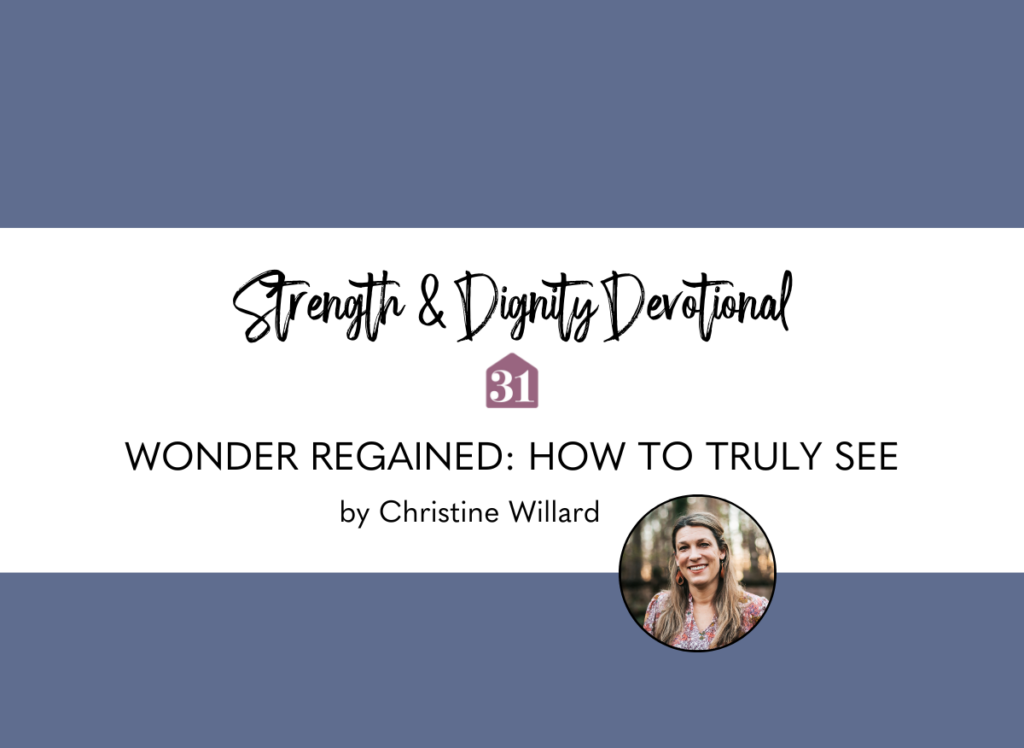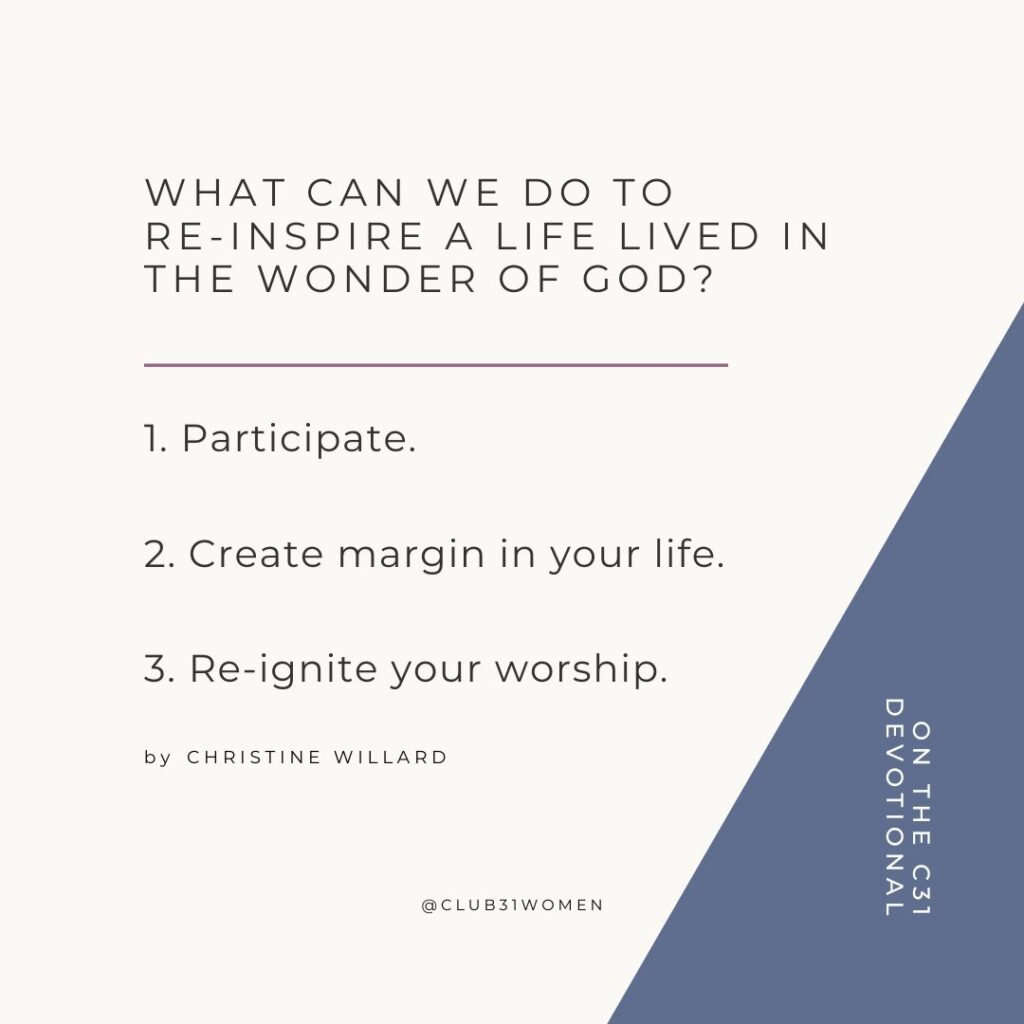Wonder Regained: How To Truly See
Have you forgotten what it’s like to have wonder? Sometimes life dries up the excitement of what God is doing.
I love summer. It’s my favorite season.
When I was a child, the sound of frogs and crickets at night beckoned me to the creek behind my house, where, to my surprise, I would find hundreds of fireflies. We used to catch them in jars and bring them back home. The little glowing creatures gave me much joy.

The creek was in the woods. My brother, my cousins, and I explored them freely. Once, I found a small area blanketed with ferns. The sun spilled through the trees and speckled the ferns gold. It was my favorite spot because, as the light danced through the trees, it felt like woodland creatures might appear at any moment.
Have you ever wondered why our childhood sense of wonder dwindles with age? Sure, life is busy as adults. We don’t roam through the woods like we used to, or sneak outside late at night to catch fireflies. Well, some of us might still. (Wink.)
But is it simply that we grow up? Or is there something else at work here?
What is it that makes us less and less impressed?
Losing Our Wonder
I believe the primary culprit is that we have lost the ability to see.
Wonder begins with seeing.
Do we pay attention to the hummingbird floating outside the window? Do we even notice the colors painted across the evening sky? Do we take the time to see?
When we lose our ability to see, we forfeit the wonder before us.
My husband Tim loves the works of John Ruskin. Ruskin was the leading art critic during the Victorian age and wrote about the importance of seeing. He writes:
“The greatest thing a human soul ever does in this world is to see something and tell what it saw in a plain way. Hundreds of people can talk for one who can think, but thousands can think for one who can see. To see clearly is poetry, prophecy and religion, all in one.”
“The greatest thing a human soul ever does in this world is see.”
Wow. Such a striking statement.
Truly seeing requires our active participation and margin. When we take the time to see the world around us, we give our minds and hearts the space needed to consider a thing, contemplate beauty, and think beyond ourselves to someone greater.
Why We No Longer See
Life crowds in with its demands. We make choices to prioritize certain things over others. Often, we stop participating in the world around us because we’ve conditioned ourselves to focus on ourselves.
What we spend our time on shows what we truly worship. And what we worship reveals our truest self.
I’m reminded of the Psalmist who described those who trust in idols the following way in Psalms 115:
“Their idols are silver and gold, the work of human hands. They have mouths, but do not speak; eyes, but do not see. They have ears, but do not hear; noses, but do not smell. They have hands but do not feel, feet but do not walk, and they do not make a sound in their throat. Those who make them become like them; so do all who trust in them.” (v.4-8, ESV)
Did you catch that? All who trust in idols become like them.
How are the idols described?
Eyes . . . but do not see.
Is it possible that one of the reasons we no longer see is because we no longer truly worship our Creator? Instead, we celebrate the idols our own hands have made. When we worship anything other than God, we lose our ability to see, our capacity to perceive beauty and truth, and our sense of wonder.
It’s easy to fashion idols unknowingly. For example, sometimes our idols take the form of the comforts of this world or the ministries we build.
But wonder is produced through the worship of our Creator. If we enjoy God, we will praise him. Our worship reflects our delight.
If the God of this universe fails to inspire us, it will reflect in our words, actions, and practices. When we live in awe of Him, that awe is contagious, and it passes on to others.

What can we do?
What do we need to do to re-inspire a life lived in the wonder of God? How can we breathe life into our dry bones so we see? Here are three ways that help me keep that lightning-bug sense of wonder I had as a little girl.
1. Participate.
Be active not just in your calendar events but in the natural world around you. Take daily walks. Spend time outside. Find ways to adventure right where you live.
2. Create margin in your life.
Give yourself space to see the God-painted hues across the butterfly’s wings. Listen to the lulling movement of waves upon the shore the next time you’re on a beach vacation. Chase lightning bugs.
3. Re-ignite your worship.
Go on a spiritual retreat—something as simple as a staycation or local bed-and-breakfast—where you can let God woo you through prayer and reflection.
When I make it my goal to see what God created, he inevitably opens more than my eyes. He opens my heart so that I see things about him I never noticed before. And I fall into his wonder.
In His Word
Meditate on Jeremiah 5:21-22a, ESV: “Hear this, O foolish and senseless people, who have eyes, but see not, who have ears, but hear not. Do you not fear me? declares the LORD. Do you not tremble before me?”
In Your Life
What is one thing you can do today to begin seeing? Perhaps sit on your front porch and watch the sunset. Or, sit down with your child as they study biology, marveling at the human body our Creator formed.
We Recommend
The Summer Slowdown by Chris’s husband Tim Willard. An online workshop that includes three short slowdown teachings, accompanied by a hundred-page workbook that teaches the slowdown method: See. Slow. Participate. This course will inspire you to take a breath and revitalize your life.
Let’s Connect
For inspiration on pursuing the Way of beauty in life and home, follow Chris on Instagram. She also writes weekly devotionals through her Mend membership newsletter on Substack.
